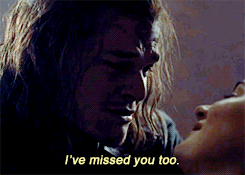Post by Deleted on May 23, 2016 11:59:15 GMT
Here is Alyssa Rosenberg's review at the Washington Post
In Lin-Manuel Miranda’s “Hamilton,” George Washington tells his brilliant, frustrating secretary and surrogate son Alexander Hamilton, “Let me tell you what I wish I’d known / When I was young and dreamed of glory / You have no control: / Who lives / Who dies / Who tells your story?” “Game of Thrones” has always been George R.R. Martin’s effort to dismantle a certain kind of glorious story, to reveal the monsters who hide in knights’ shining regalia and honor the women who emerge from bloody, violent marital beds and fight for every inch of space to create their own stories within the public narratives of their lives. But tonight’s “Game of Thrones” was a particularly powerful exploration of how the people who live through great events begin to shape those narratives even before their stories are finished, if only to find a way to keep moving forward and avoid sucuumbing to madness or despair.
In Hodor’s (Kristian Nairn) end is the beginning of our discussion, of course. The hulking stableboy’s nickname, the only word he speaks, has always been something of a genial joke for the characters in “Game of Thrones.” If not actively unkind to him, even the most decent of the Starks never bothered to break through their exasperation with Hodor’s repetitive, yet endlessly expressive, word of choice. And tonight we learned how he acquired it.
Bran Stark (Isaac Hempstead Wright) has spent this season of “Game of Thrones” exploring his family’s history, from his early glimpses of his aunt Lyanna (Cordelia Hill) to the fatal, mysterious events at the Tower of Joy that sealed Ned Stark’s (Sean Bean) reputation. If the first lesson Bran learned was that Ned’s heroic story was actually the result of a breach of knightly chivalry, tonight he learned a harder truth: that you can’t excavate the past without changing it, whether by letting go of the version of the story that you knew, or by literally altering history.
As Bran lingers in his trance while an army of wights advances on him, his protector Meera Reed’s (Ellie Kendrick) pleas bleed over into the past. And the young Hodor (Sam Coleman), who as an adult the Starks have treated as impenetrable but useful, proves more sensitive than anyone imagined. Meera’s words reach his ears, sending him into a seizure. He repeats her plea to “Hold the door,” a phrase that would become “Hodor” as the seizure takes him.
...
In Hodor’s (Kristian Nairn) end is the beginning of our discussion, of course. The hulking stableboy’s nickname, the only word he speaks, has always been something of a genial joke for the characters in “Game of Thrones.” If not actively unkind to him, even the most decent of the Starks never bothered to break through their exasperation with Hodor’s repetitive, yet endlessly expressive, word of choice. And tonight we learned how he acquired it.
Bran Stark (Isaac Hempstead Wright) has spent this season of “Game of Thrones” exploring his family’s history, from his early glimpses of his aunt Lyanna (Cordelia Hill) to the fatal, mysterious events at the Tower of Joy that sealed Ned Stark’s (Sean Bean) reputation. If the first lesson Bran learned was that Ned’s heroic story was actually the result of a breach of knightly chivalry, tonight he learned a harder truth: that you can’t excavate the past without changing it, whether by letting go of the version of the story that you knew, or by literally altering history.
As Bran lingers in his trance while an army of wights advances on him, his protector Meera Reed’s (Ellie Kendrick) pleas bleed over into the past. And the young Hodor (Sam Coleman), who as an adult the Starks have treated as impenetrable but useful, proves more sensitive than anyone imagined. Meera’s words reach his ears, sending him into a seizure. He repeats her plea to “Hold the door,” a phrase that would become “Hodor” as the seizure takes him.
...
















